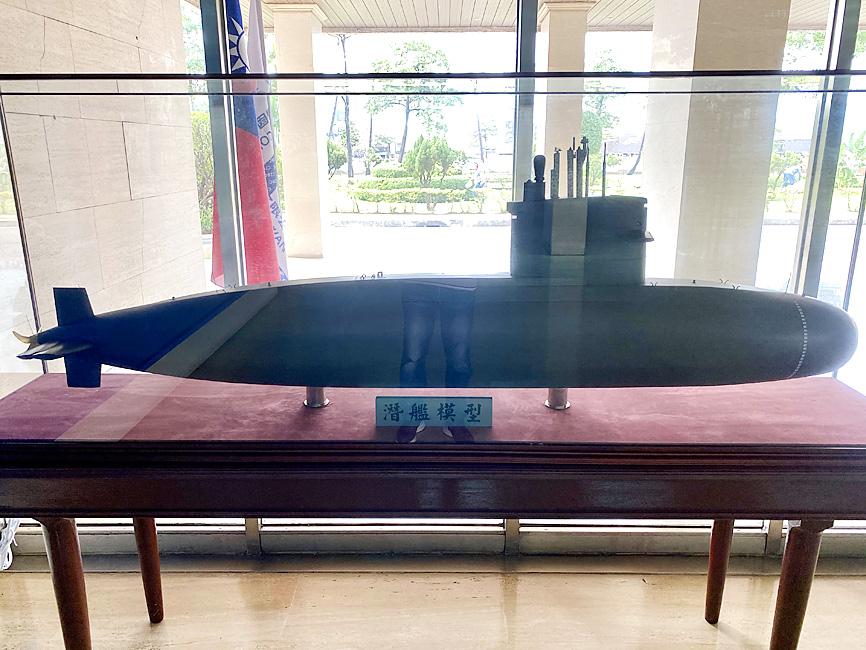Pending the successful completion of the nation’s first indigenous submarine in September next year, the Executive Yuan might allocate a budget of as much NT$300 billion (US$10 billion) for seven additional submarines, a source said.
The military’s medium and long-term plans call for eight submarines to meet defense needs, so the government is keen to get started on additional submarines if the first one passes tests, the source said, adding that the legislature would need to approve the budget.
The budget for the first submarine, codenamed the Haichang Project, was NT$49.3 billion to be spent from 2019 to 2025 for expenses including manufacturing and hardware.

Photo: Hung Chen-hung, Taipei Times
The exact cost of the proposed seven submarines would depend on the exchange rate, raw material prices, procurement costs and other factors, the source said.
However, given that facilities are already in place, the additional submarines are expected to cost less than the first unit, the source said, adding that the facilities can accommodate simultaneous construction and maintenance operations for three submarines.
Six pressure hull sections and sail cover sections of the first unit are complete, and the completed sections have passed strength testing, the source said.
Several pieces of “red zone equipment,” such as the sonar system, have also been procured, and the torpedo tubes have been installed for testing, the source said.
Forty officers from the navy’s 256th Submarine Squadron are on hand at CSBC Corp, Taiwan (台船) facilities where the submarine is being built, studying the vessel’s operation, and preparing for handover and testing, the source said.
“They are assisting the engineers with the construction process, and they will be the seeds of the submarine program that will go on to train others,” the source said.
Democratic Progressive Party Legislator Wang Ting-yu (王定宇) on Tuesday said that the production of additional submarines would be easier, but added that the procurement of components from overseas would depend on foreign authorities.

The Ministry of Foreign Affairs (MOFA) yesterday said it is closely monitoring developments in Venezuela, and would continue to cooperate with democratic allies and work together for regional and global security, stability, and prosperity. The remarks came after the US on Saturday launched a series of airstrikes in Venezuela and kidnapped Venezuelan President Nicolas Maduro, who was later flown to New York along with his wife. The pair face US charges related to drug trafficking and alleged cooperation with gangs designated as terrorist organizations. Maduro has denied the allegations. The ministry said that it is closely monitoring the political and economic situation

UNRELENTING: China attempted cyberattacks on Taiwan’s critical infrastructure 2.63 million times per day last year, up from 1.23 million in 2023, the NSB said China’s cyberarmy has long engaged in cyberattacks against Taiwan’s critical infrastructure, employing diverse and evolving tactics, the National Security Bureau (NSB) said yesterday, adding that cyberattacks on critical energy infrastructure last year increased 10-fold compared with the previous year. The NSB yesterday released a report titled Analysis on China’s Cyber Threats to Taiwan’s Critical Infrastructure in 2025, outlining the number of cyberattacks, major tactics and hacker groups. Taiwan’s national intelligence community identified a large number of cybersecurity incidents last year, the bureau said in a statement. China’s cyberarmy last year launched an average of 2.63 million intrusion attempts per day targeting Taiwan’s critical

‘SLICING METHOD’: In the event of a blockade, the China Coast Guard would intercept Taiwanese ships while its navy would seek to deter foreign intervention China’s military drills around Taiwan this week signaled potential strategies to cut the nation off from energy supplies and foreign military assistance, a US think tank report said. The Chinese People’s Liberation Army (PLA) conducted what it called “Justice Mission 2025” exercises from Monday to Tuesday in five maritime zones and airspace around Taiwan, calling them a warning to “Taiwanese independence” forces. In a report released on Wednesday, the Institute for the Study of War said the exercises effectively simulated blocking shipping routes to major port cities, including Kaohsiung, Keelung and Hualien. Taiwan would be highly vulnerable under such a blockade, because it

Conflict with Taiwan could leave China with “massive economic disruption, catastrophic military losses, significant social unrest, and devastating sanctions,” a US think tank said in a report released on Monday. The German Marshall Fund released a report titled If China Attacks Taiwan: The Consequences for China of “Minor Conflict” and “Major War” Scenarios. The report details the “massive” economic, military, social and international costs to China in the event of a minor conflict or major war with Taiwan, estimating that the Chinese People’s Liberation Army (PLA) could sustain losses of more than half of its active-duty ground forces, including 100,000 troops. Understanding Chinese